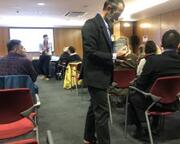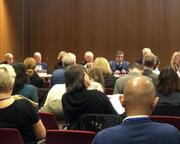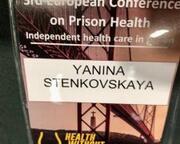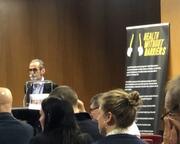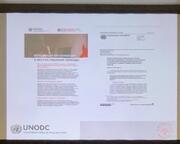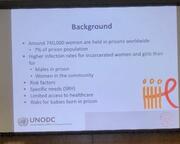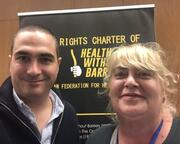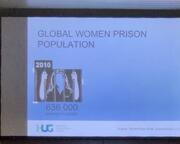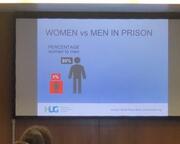Health care in a prison cannot be designed without the mobilization of the efforts of the authorities and civil society. Maintaining the health of people in prison is a difficult task, but it is the direct responsibility of governments to solve it.
Ethics, addictions, harm reduction, communicable and non-communicable diseases, mental health – this is not a complete list of issues discussed at the 3rd European Prison Conference “Health in Prisons: Government Responsibility”, which takes place on November 21-22 in Lisbon (Portugal).
The meeting is attended by leaders of organizations recognized as the most successful in the implementation of national advocacy and service projects for HIV prevention in Europe, America, Asia, Africa, and Australia. Jorge Costa, Deputy Minister of Justice of Portugal, also attended the conference.
UnMode attends the conference accompanied by partners from the Prison Health and Rights Consortium (PHRC)
The PHRC was formed in 2018 on the basis of a shared understanding that in order to promote and protect the rights of people in prisons in Europe and the former SNG countries and access to rights and health services, a special advocacy approach is needed, taking into account the special isolation of prisoners and the realities of the penitentiary system. .
A consortium of ex-prisoners, communities of people who use drugs with experience in prison, human rights activists, harm reduction activists, health professionals practicing in prisons from European countries, combine their experience in harm reduction and public health to protect the right to health of people in prisons.
Since its foundation, the Consortium has:
promotes enhanced cooperation and exchange of experience, promotes harmonization of assistance and access to services in prison with those available in the community;
raises awareness of the rights of prisoners and the principles of equivalence and continuity of care between prison and society at the national and international level.
advocates for human rights, the independence of prison medicine and the integration of prison medicine into the general health care system as a condition for effective and high-quality access to care for people in prison.
Hugues DE SUREMAIN, representative of the European Prison Litigation Network (EPLN), our partner in the PHRC Consortium, made a presentation on “Systemic Failures of National Health Systems in Prisons” on the first day of the conference.
He raised the issue of the independence of prison medicine and emphasized access to health care in prisons. As examples, the expert cited cases from the jurisprudence in European countries.
Also during the first day of the Conference, the participants shared the experience of their countries and raised issues of the role of the internal control service in the penitentiary system in respect of human rights, gender aspects of health care in prisons, taking into account the needs of women and transgender people, spoke about the prospects for investigating criminal offenses in prisons and raised the issue of migrants.
“The day is very busy: information is so accurate. The only thing all these people forget is that behind every figure they report here is someone’s life. Behind every diagram are broken destinies. Unfortunately, even at the prison health conference, representatives of partner organizations do not stop the stigmatization of dividing people into “us” and “them”. I am a drug addicted one who has experienced the prison system, and I remember very well that it is so hard to get the slightest service or help there. My work is to change that. To enable people to get out alive. I’m incredibly looking forward to tomorrow. I want to shake everyone. And shout: “Wake up!”, – says Yana.
Over the course of two days, participants will share their experiences and analyze best practices. The speech of Yanina Stemkovskaya, representative of UnMode in Ukraine, concludes the Conference.

